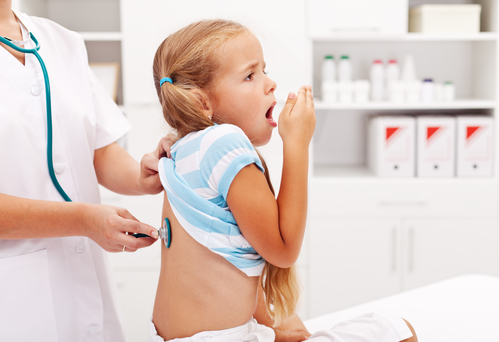It's That Time of Year!
Coughing is a natural, normal response of the body. It is an effort to force more air and secretions out of the lungs. A cough can be the result of a viral infection, a bacterial infection, allergies, or even gastroesopheagal reflux. It is not abnormal for a child to cough for up to a week, but there are certain situations when you should contact your pediatrician.

Parents are often concerned about the color of what their child produces when they are coughing. Sputum may be any color, and darker colors are not necessarily an indication of a bacterial infection. Yellow or green phlegm is part of the healing process and is common in viral infections. It is a sign that the airway is repairing itself and trying to clear the old tissue. This does not mean that your child needs antibiotics. Instead, treat your child with supportive measures; increase fluid intake, use a cool mist humidifier during sleep and nap time, use nasal saline spray or rinses, and if your child is over one year old, try a teaspoon of honey. You should avoid the use of over the counter cold and cough medicines if your child is under the age of six.
Sometimes, however, the cough is a sign of a bacterial infection, and may even be a result of pneumonia. Pneumonia may develop from a viral or a bacterial infection. When it is the result of a viral illness, it will occur at the times of year when viruses are more easily spread, like the fall, winter, and early spring. In fact, in children under 2 years old, studies have shown that pneumonia is the result of a viral illness in up to 80% of these cases. In addition to coughing, the signs of pneumonia include fever, decreased appetite and decreased energy. It is also important to monitor your child for increased work of breathing, shortness of breath, nasal flaring, accessory muscle use, chest pain, and wheezing. If at any point you are concerned that your child is in distress, you should contact the pediatrician immediately.
When pneumonia is the result of a viral infection, there is no benefit to treating with antibiotics. In such cases, as with other virally induced coughs, treatment is supportive. You can treat your child’s fever with fever reducing medication if they are uncomfortable. If you were to give your child a “cough suppressant,” you would prevent coughing, and thereby limit removal of the infected secretions.
Many of the cases of pneumonia that pediatricians see in their office fall into the category of “community acquired pneumonia (CAP).” This is defined as “the presence of signs and symptoms of pneumonia in a previously healthy child caused by an infection that has been acquired outside of the hospital.” There is a common bacteria that often causes CAP, and theses cases are usually slow to progress and accompanied by fatigue, sore throat, low-grade fever, and cough for 3 to 5 days. These cases can be treated with antibiotics.
Viral pneumonia should resolve in a few days, but the cough may linger for weeks. If your child is being treated for bacterial pneumonia, he or she should feel better after 24 to 48 hours of antibiotics. If he or she is not improving after that time, you should consult your pediatrician. It is important to remember always complete the prescribed course of medication. If your child exhibits signs of difficulty breathing, persistent fever, or any other concerning symptoms, you should contact your pediatrician immediately.
Always remember that coughing can result from a variety of causes. You should alert your pediatrician if the cough is persistent, worsening, or preventing your child from participating in daily activities.
Featured Blogger
Leslie Greenberg

Leslie Greenberg, MD, FAAP is a general pediatrician practicing with Princeton Nassau Pediatrics. She graduated from Brandeis University magna cum laude with a BA in sociology. She attended medical school at Tufts University School of Medicine and completed her residency training at The Children's Hospital of Montefiore in the Bronx, NY. She currently lives in the West Windsor, NJ area with her husband and two sons. She has been with PNP since 2009. Princeton Nassuau Pediatrics is a group of board certified general pediatricians whose mission is providing the highest level of health care to the children of the greater Princeton, West Windsor, Monroe, and Pennington areas. The group provides state of the art care for children from infancy through college based on the most up-to-date medical advances. PNP has four locations, and offers routine well care visits, same day sick visits, weekend/holiday and evening urgent care coverage, as well as full in-office laboratory services. Visit www.princetonnassaupediatrics.com.




























